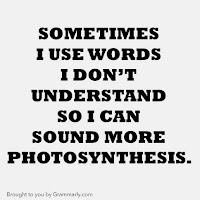Mostly these days, I novel and social media (and make up
verbs). In the past I have short-storied,
fanficc’d, blogged, edited/rewritten,
developed technical manuals, produced academic books and papers, and taken the occasional
stab at corporate marketingspeak. I’ve worked in APA, AP, Chicago, MLA,
Microsoft, and a bunch of house styles. Across all these different kinds of
written communication, here’s some stuff I’ve learned:- There are reasons everyone except AP-style aficionados are devoted to serial commas. (Sorry, journalism students, the serial comma really does make things clearer.)
- The ability to create a compelling novel does not translate into a similar talent for composing back-cover copy, aka “blurbs.” That is a totally different kind of writing, and most of us novelists have no clue what we’re doing in marketingland.
- An English degree does not confer magical ability to use a semicolon. Probably best you don’t.
- People who don’t know what a dangling participle is aren’t stupid. Sometimes they’re the brightest minds in their field, and they deserve respect. (And possibly a gentle suggestion for fixing the dangle.)
- Technical styles often restrict sentences to 20 to 30 words max. Even for novelists, it isn’t a bad idea to count words in a sentence that seems long. If you catch one with more than 35 words, it’s probably confusing to readers, no matter what you’re writing.
- I thought I was good at telling a story through dialogue. Then I took a screenwriting class. Whoa. Just because you can do one does not mean you can necessarily do the other. (See item on back-cover copy above.)
- Microsoft Word and other grammar/spelling checkers do not fix usage errors. Or, to quote The Princess Bride: “You keep using that word. I do not think it means what you think it means.” (Phenomenon also known as, Editors Are Our Friends.)
- If you write a thing and the reader understands the point you were trying to make and reacts in a way you wanted, you win. Full stop. End discussion.
This list could go on forever, hyperbolically, but I’ll cut
it off now. Any universal-to-all-media writing bits you’ve picked up and want to
vent discuss?

